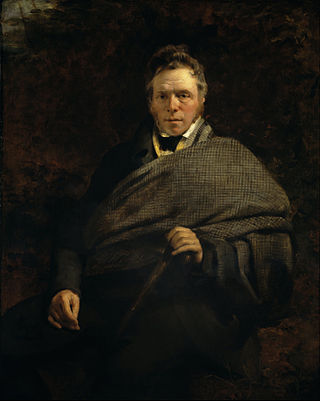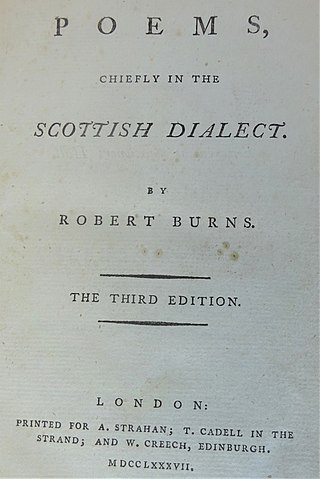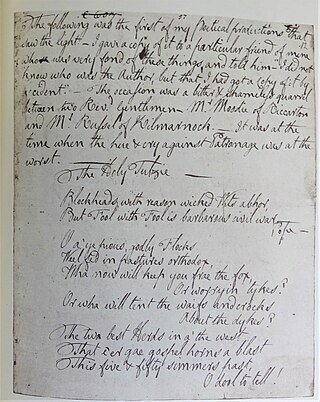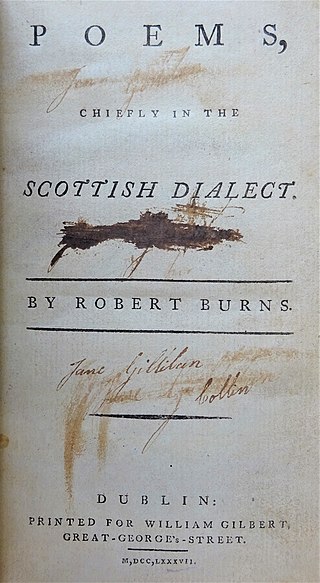Related Research Articles

The Yarrow Water is a river in the Borders in the south east of Scotland. It is a tributary of the Ettrick Water and renowned for its high quality trout and salmon fishing. The name "Yarrow" may derive from the Celtic word garw meaning "rough" or possibly share a derivation with the English name "Jarrow".

Archibald David Constable was a Scottish publisher, bookseller and stationer.

James Hogg was a Scottish poet, novelist and essayist who wrote in both Scots and English. As a young man he worked as a shepherd and farmhand, and was largely self-educated through reading. He was a friend of many of the great writers of his day, including Sir Walter Scott, of whom he later wrote an unauthorised biography. He became widely known as the "Ettrick Shepherd", a nickname under which some of his works were published, and the character name he was given in the widely read series Noctes Ambrosianae, published in Blackwood's Magazine. He is best known today for his novel The Private Memoirs and Confessions of a Justified Sinner. His other works include the long poem The Queen's Wake (1813), his collection of songs Jacobite Relics (1819), and his two novels The Three Perils of Man (1822), and The Three Perils of Woman (1823).

Robert Anderson (1770–1833), was an English labouring class poet from Carlisle. He was best known for his ballad-style poems in Cumbrian dialect.
The Queen's Wake is a narrative poem by James Hogg, first published in 1813. It consists of an Introduction, three Nights, and a Conclusion, totalling over five thousand lines, and there are also authorial notes. The poem presents the contributions, in various metres, of a series of Scottish bards to a competition organised by Mary, Queen of Scots on her arrival in Scotland from France in 1561.

Poems, Chiefly in the Scottish Dialect is commonly known as the Third or London Edition and sometimes the Stinking Edition. It is a collection of poetry and songs by Robert Burns, printed for A. Strahan; T. Cadell in the Strand; and W. Creech, Edinburgh. MDCCLXXXVII The date of publication for the London Edition was in November 1787, however Strahan and Cadell had previously advertised for sale the 'Second' or 'Edinburgh Edition' using the 500 or so copies that William Creech still had that were unsold. The successful selling of these made a truly new 'London Edition' a commercially viable enterprise.
The Forest Minstrel (1810) is an anthology of 83 songs, assembled by James Hogg, divided into four sections: 'Pathetic Songs', 'Love Songs', 'Humorous Songs', and 'National Songs'. Hogg himself is the author of 56 items. There are also 15 by Thomas Mounsey Cunningham, 5 by John Grieve, 3 by William Laidlaw, 3 by James Gray, and one perhaps by John Ballantyne.
Lock the Door, Lariston is a border ballad by the Scottish poet James Hogg, the "Ettrick Shepherd", first published in 1811. It describes a sixteenth-century armed raid by English border reivers across the Anglo-Scottish border, met and defeated by Scottish borderers led by Jock Elliott of Lariston. Written in a traditional form, it was set to music by the 1850s, and is now a commonly performed Scottish folk song.
The Spy was a periodical directed at the Edinburgh market, edited by James Hogg, with himself as principal contributor, which appeared from 1 September 1810 to 24 August 1811. It combined features of two types of periodical established in the 18th century, the essay periodical and the miscellany. As an outsider, Hogg used his periodical to give a critical view of the dominant upper-class culture of Edinburgh, with Walter Scott and Francis Jeffrey as its leading lights, and to launch his career as a writer of fiction as well as poetry.
The Pilgrims of the Sun is a narrative poem by James Hogg, first published in December 1814, dated 1815. It consists of four cantos, totalling somewhat less than 2000 lines. In similar vein to 'Kilmeny' in The Queen's Wake (1813), it tells of a young woman's journey to an ideal world and her return to earth.
Mador of the Moor is a narrative poem by James Hogg, first published in 1816. Consisting of an Introduction, five cantos, and a Conclusion, it runs to more than two thousand lines, mostly in the Spenserian stanza. Set in late medieval Scotland, it tells of the seduction of a young maiden by a charismatic minstrel and her journey to Stirling in search of him, leading to the revelation that he is the king and finally to their marriage and the christening of their son.
Winter Evening Tales is a collection by James Hogg of four novellas, a number of short stories and sketches, and three poems, published in two volumes in 1820. Eleven of the items are reprinted, with varying degrees of revision, from Hogg's periodical The Spy (1810‒11).
Queen Hynde (1825) is an epic poem in six cantos by James Hogg. Set in western Scotland in the sixth century, it tells the story of the defeat of an invading Norwegian army by forces loyal to Queen Hynde, advised by Columba, and of the winning of her hand by the legitimate claimant of the throne Eiden. It is mostly in octosyllabic couplets.
Songs, By the Ettrick Shepherd is a collection of 113 songs by James Hogg published in 1831. All except one of the songs had previously appeared in print, mostly either in Hogg's earlier publications or in a range of periodicals.
A Queer Book (1832) is a collections of 26 poems, mostly short narratives, by James Hogg, all but two of which had been previously published, more than half of them in Blackwood's Edinburgh Magazine.
Altrive Tales (1832) by James Hogg is the only volume to have been published of a projected twelve-volume set with that title bringing together his collected prose fiction. It consists of an updated autobiographical memoir, a new novella, and two reprinted short stories.
Scottish Pastorals (1801), containing five poems and two songs, was the first book published by James Hogg.

'The Holy Tulzie', 'The Twa Herds' or 'An Unco Mournfu' Tale was a poem written in 1784 by Robert Burns whilst living at Mossgiel, Mauchline, about a strong disagreement, not on doctrine, but on the parish boundaries, between two 'Auld Licht' ministers, John Russel and Alexander Moodie It was followed by "The Holy Fair", "The Ordination", "The Kirk's Alarm", "Holy Willie's Prayer", etc.

Poems, Chiefly in the Scottish Dialect was the second 'pirated' issue of Robert Burns's work, being published in Ireland at Belfast without permission from or payment to the author or publisher. It is a so-called 'Stinking Edition', carrying the error 'Stinking' for the Scots word 'Skinking' (watery) in the poem "To a Haggis" because the type setters copied from a 1787 'Stinking Edition' of Poems, Chiefly in the Scottish Dialect . It has been shown to be from the same print setting as the 'Belfast Edition' but with a different title page.

Poems, Chiefly in the Scottish Dialect was a 'pirated' edition of Robert Burns's work, being published in Ireland without permission from or payment to the author or publisher. It is a so-called 'Stinking Edition', carrying the error 'Stinking' for the Scots word 'Skinking' (watery) in the poem "To a Haggis" because the type setters copied from a 1787 'Stinking Edition' of Poems, Chiefly in the Scottish Dialect .
References
- ↑ James Hogg, The Mountain Bard, ed. Suzanne Gilbert (Edinburgh, 2007), xli.
- ↑ Gillian Hughes, James Hogg: A Life (Edinburgh, 2007), 39.
- ↑ Gillian H. Hughes, Hogg's Verse and Drama: A Chronological Listing (Stirling, 1990).
- ↑ Hughes, op. cit., 66‒67; Valentina Bold, James Hogg: A Bard of Nature's Making (Oxford etc., 2007), 109.
- ↑ Gilbert, op. cit, 454.
- ↑ Hughes, op. cit., 174.
- ↑ Bold, op. cit., 108‒15.
- ↑ The reviews are listed by Gilbert, op. cit., lxviii.
- ↑ The Poetical Register, 6 (1807), 549.
- ↑ Eight of the reviews are listed by Gilbert, op. cit., lxviii.